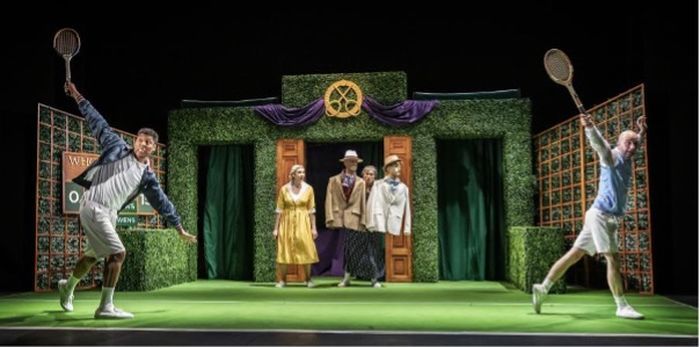Pride and Prejudice* (*sort of): Pride and prejudice and panto is a joy
It is a truth universally acknowledged that adding music, dancing, and silliness to a Jane Austen novel will certainly make you laugh.

“Stop being a fucking smart arse! It’s not ladylike.” Maybe this isn’t exactly what Jane Austen wrote for Mrs Bennet, but it feels about right! Such is the style of Isobel MacArthur’s reimagining of Austen’s famous novel of love and marriage. Pride and Prejudice* *(sort of) gets to the heart of Austen’s characters and themes, and re-deploys them for outlandish, bawdy—occasionally gaudy—comedy.
The story is the same, but the audience are guided by the servants (notably absent in the original), who swap rubber gloves for their mistresses’ dresses and re-enact the story* (*sort of). This multi-roling showed off the cast’s versatility—they play multiple roles, yet inhabit each new character with such life and fullness that you forget the small size of the cast.
“The production has a manic, but polished quality”
This is a true ensemble production. The entire cast perform with an energy and commitment that carries the story from joke to gag to song. Hannah Jarrett-Scott merits praise for the sheer number of characters she plays—if they’re not a Bennet sister, they’re probably Jarrett-Scott—providing the show with dynamism and energy throughout. Her Mr Bingley was the highlight, though, embodying his re-imagined character as fantastically obnoxious, brimming with bought confidence and lacking in brains. Likewise, Leah Jamieson captures an Elizabeth Bennet for the modern era, swigging a bottle of vodka before scolding Mr Darcey with a rendition of ‘You’re So Vain’.
The style of comedy is simple, but consistently funny: the characters’ traits are amplified into stereotypes (Darcey as self-righteous, Lydia a party-girl, Mr Collins dry and speckly), allowing them to use outrageous language that replaces all Austen’s subtlety with in-your-face comedy. Think pantomime meets Jane Austen.
There is music throughout the production, but it doesn’t feel like a musical. Rather, pop classics are peppered throughout to heighten the irreverent comedy of a scene—Darcey proposes accompanied by backing-singers; musicians burst from a (Jane Aust-)bin to serenade Elizabeth and Wickham with accordion and xylophone. The production has a manic, but polished quality. Everyone is always contributing something, whether serving wagon wheels on silver platters, or playing Elvis Costello on the harp.
This sense of polish extends to the technical. The set, framed by a grand staircase, creates a versatile space, while period and stylised features combine to reflect the show’s character—somewhere between faithful and farcical. The sound and lighting, though, were technically impeccable. Music started and stars appeared at literally the snap of Darcey’s fingers.
While the panto-style comedy is reliably humorous, it becomes somewhat repetitive—the interval was a needed break from constant, high-energy gags. The drama which makes Austen’s original story so beloved was beginning to get lost, but luckily the second half managed to avoid over-doing the comedy. The occasional serious moments keep the audience’s interest and keep the show varied.
This irreverent re-telling of Jane Austen’s classic novel is far from the decorous civility of the original. But it is certainly an entertaining night, filled with Irn-Bru, obnoxious men, and don’t be surprised if some of them burst into song occasionally.
 News / Report suggests Cambridge the hardest place to get a first in the country23 January 2026
News / Report suggests Cambridge the hardest place to get a first in the country23 January 2026 Comment / Cambridge has already become complacent on class23 January 2026
Comment / Cambridge has already become complacent on class23 January 2026 News / Students condemn ‘insidious’ Israel trip23 January 2026
News / Students condemn ‘insidious’ Israel trip23 January 2026 Comment / Gardies and Harvey’s are not the first, and they won’t be the last23 January 2026
Comment / Gardies and Harvey’s are not the first, and they won’t be the last23 January 2026 News / Cambridge ranks in the top ten for every subject area in 202623 January 2026
News / Cambridge ranks in the top ten for every subject area in 202623 January 2026










